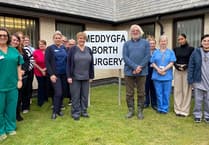While there is much to celebrate in the National Health Service as it turns 75, sadly its ability to deliver quality care in a timely manner has been negated by a lack of funding from both Westminster and Cardiff Bay.
And nothing highlights this shortfall more than the extended waiting times in rural Wales for people to receive timely cancer care.
Every one of us has been touched through ourselves, family or friends having one form or another of the disease. And key to a successful outcome is timely care.
Stark new figures have revealed that north and west Wales have the lowest number of cancer doctors in the UK, with Llyr Gruffydd MS describing the situation as alarming.
Macmillan Cancer Support has launched a new campaign, What Are We Waiting For?, calling out inaction from governments on cancer care.
Macmillan’s latest analysis has found that an additional 180,000 people in the UK – equivalent to the entire population of Carmarthenshire – have waited ‘too long’ for vital tests to diagnose cancer and to start treatment over the past decade because of missed targets.
For some forms of cancer, the figures are even worse. Only a third of people with gynaecological cancer (32.8 per cent) received their treatment within the 62-day target timeframe. That’s simply not acceptable.
For too many cancer patients in Wales, the reality is that cancer treatments and the whole process of follow-ups, is disjointed, adding to the already high levels of stress brought on by a diagnosis.
The cancer care system is confusing, disjointed and often fails those with the disease as persons.
Delayed test results need chasing. Delayed diary dates for the next appointment need chasing. There are cancelled consultations, or consultations where the wrong people turned up at the wrong time to talk about the wrong procedure.
Data from the Royal College of Radiologists’ 2022 workforce census shows that in north and west Wales, there are just 2.1 oncologists (medical and clinical) per 100,000 older people. This compares with 8.1 in south Wales
Once more, the people of this region are being forgotten or are fobbed off with second-class treatment. Enough is enough.


